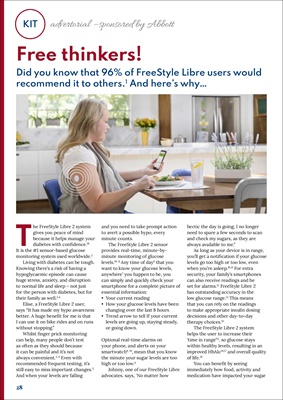
28KIT advertorial - sponsored by Omnipod
Diabetes technology: age
is no barrier to entry
Russell Millar was diagnosed with Type 1 diabetes at
the age of 18, just after completing his A level exams. It
was the summer of 1989.
It fits superbly
into my daily work
and leisure time
and I spend less
time worrying
about my diabetes.
~ Russel Millar
Russell Millar is an Omnipod® ambassador and has an ongoing commercial relationship with Insulet.
"At the time of being diagnosed, I'd
never heard of it. I just had no idea. I
was due to go on holiday but before
doing so, I went to see my GP as I'd
been losing weight and needing to
go to the loo all the time. The GP
suggested it was type 1 diabetes
there and then. At the time we lived
near St. Thomas Hospital in central
London and my parents took me in
straight away. I could barely stand
up when I was admitted. Initially, I
said I would not do injections, but I
was given an orange to practice on
- to 'learn my craft' as it were - and
a week later, I was doing my own
injections and was discharged."
At this point, Millar was in his
early 20s and says, "Just kept it
quiet. I didn't talk about it. I spent
a year or so learning to live with
the condition. I'd found it totally
life changing, especially when I
had a year at college undertaking
a degree in Travel and Tourism. I
had to leave in the last part of the
first year as I couldn't get a work
placement, as there was a clear
barrier to employing a person living
with diabetes in the travel sector as
a tour guide. Consequently, I had to
take a career change and went into
real estate and have been doing that
ever since."
A family affair
Millar got married at the age of 31,
and has three children, all girls.
Unusually, two of the children also
developed Type 1 diabetes when they
were little.
"To be honest, it was all immensely
difficult and challenging, but we
attended many diabetes camps,
which were about children learning
to live with diabetes, and meet other
children with diabetes. I even ended
up doing talks at some of those
camps," Millar says.
So, this was a total change from
his younger self. He was not just a
parent of children with diabetes,
but was a parent with diabetes too,
and now 'out and proud' and talking
about his experience with others.
How times change
When first discharged from hospital
after being diagnosed, Millar
remembers, "I had long-acting and
short-acting insulin and I'd dose
myself using syringes with big
needles. Way back then, glucose
testing was done using a little stick
that you put into your urine which
then changed colour and gave an
indication of what was happening
with your glucose levels. Looking
back, it's hard to imagine this was
how it was done, but that's all there
was back then. Personal blood test
meters came on the scene years
later. That was a significant change,
though the equipment at the time
had its drawbacks. It could be hard to
do a finger prick, so I didn't do it too
often. I don't remember it being that
user-friendly, not necessarily easy to
carry around or use in public."
Millar transitioned from using
syringes to using insulin pens in his
late 30s/early 40s, known as MDI